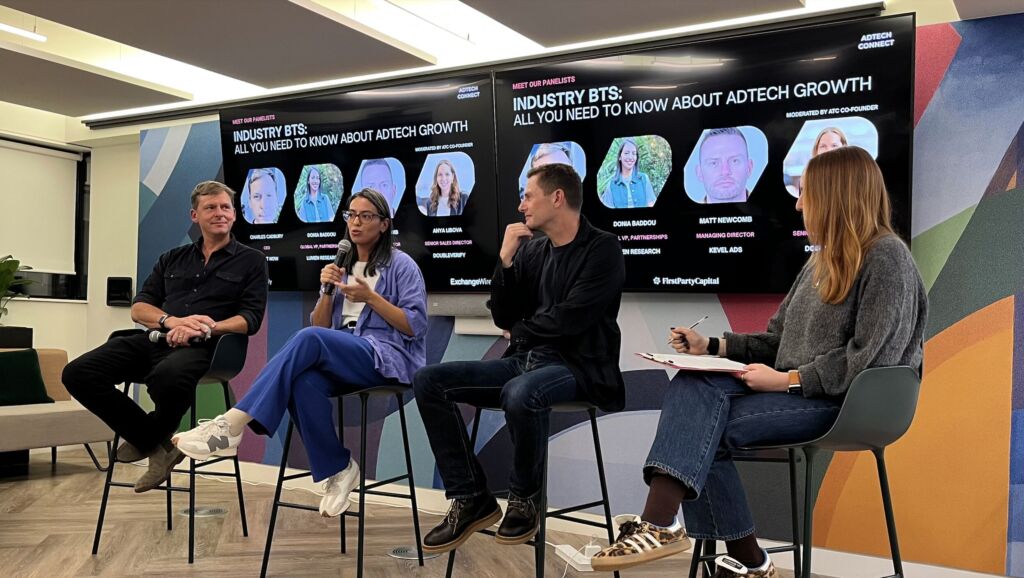Risk, Reward, and Resilience: A Look Behind the Industry Curtain at AdTech Connect
by on 24th Oct 2025 in News

At AdTech Connect’s latest event, the goal was to lift the lid on the journeys of ad tech companies. The discussions focused on how ad tech start ups actually raise the funding they need to begin, and the benefits and challenges of joining them.
How are ad tech companies funded?
To kick off the evening, Rich Ashton, managing partner at FirstPartyCapital – an angel-backed venture fund which invests in ad tech – gave us a run down of the financial details. He talked us through the options ad tech startups have when it comes to raising funding.
With loans being pretty hard to secure for startups, most founders approach investors. At the start, this will most likely come from friends and family members as well as angel investors in the industry. As startups scale, they should be able to unlock other types of funding from venture capital firms, privacy equity firms, and other sources of capital.
For those not looking to become founders, there are a range of opportunities to invest. In the UK, schemes such as the Seed Enterprise Investment Scheme (SEIS) and Enterprise Investment Scheme (EIS) have been designed to encourage investment in companies under two and seven years old, respectively. The former allows investment of up to £200,000 in SEIS-eligible companies per year, with investors able to claim back up to 50% through Income Tax relief. The latter allows investment up to £1m in EIS-eligible companies, with investors able to claim back up to 30%.
Contrary to what many may believe, Ashton also made the case that anyone can get involved: you don’t need to start big – you can begin with a small amount. This applies not only to investing in the public stock market, but also to angel investing. Obviously, the key is to invest sensibly, on the scale that works for you – don’t gamble with what you can’t afford to lose.
Ashton also stressed the importance of understanding the financial situation of any startup you consider joining. “Try to be financially aware of that company’s situation. How much money have they raised? What was the valuation? Is there a likelihood of that value increasing? Weigh up the salary – the more predictable income, versus the longer-term potential lottery ticket,” he said.
Approaching an opportunity wisely: Is it worth the risk?
Leading on from Ashton’s presentation, DoubleVerify’s Anya Libova moderated a panel which dove deeper into how to properly assess the risks of joining a startup.
Upon receiving an offer to join a newly formed company, weighing up the risks versus the potential benefits can be complicated. Does the company have a good chance of growth? What’s the worst case scenario? Will it soar to success, or will you be made redundant?
Matthew Newcomb, managing director at Kevel, reemphasised the importance of finding out about the company’s funding situation. “How long can the company go without raising money or getting an injection of revenue? If you’re a seller, for example, it helps you to understand how quickly they’re going to expect you to be bringing money in. Your longevity, in that situation, could be very intimately connected to that.”
Donia Baddou, global VP of partnerships at Lumen Research, reflected on the decision making process she used when approached with offers to work at startups throughout her career. “Every time I would meet an early stage founder I would really look into their personality. Can I trust this person?” Most importantly, she considered the founder’s values.
In the later stages of her career, she increasingly considered questions such as: what is the product? Is it addressing a challenge that the market has at the moment? “If it’s not a need, if it’s not actually solving a problem in the market, it’s just not going to work,” she said.
She also drew attention to assessing how the company plans to go to market: “How is this company planning on approaching the sales strategy and the development of the company? What is their roadmap for the integration of the product or offering?” Asking these questions will allow any risk to feel more calculated.
Charles Cadbury, Say It Now CEO, placed the focus on assessing your risk appetite. Is it aligned with where that business sits? If the business doesn’t succeed, would you be happy to take it as a learning experience? “This is a risky place to operate, but the rewards are there and the learning opportunities are massive,” he stated.
Joining a startup: What are the benefits?
Next, what are the benefits of actually joining a startup, versus a larger company? A main benefit of being one of the first employees at a startup is the deep understanding you’ll gain of how the business operates.
Newcomb described a previous role at a startup at which he joined as the second employee and became the CEO within seven years. “I ended up taking a big punt on it, and it worked out,” he explained. He attributed his quick rise to success to having joined the company at such an early stage. “I was the only person in the company apart from the incumbent CEO who understood the entirety of the business. I had to understand all the nuts and bolts.”
Newcomb elaborated further on the potential benefits of joining a startup: “The opportunity to go and get into a small environment and really understand how a business grows, and be exposed to the CEO or CRO all the time… it’s such a fantastic learning experience. You’re always going to see more in an environment like that.”
Baddou also recalled her experiences at several different startups. When you are one of the first ten or so employees to arrive, “you have four different jobs, and that’s what’s exciting about it… I don’t think that can be replicated at any other stage of a company’s growth.” As it grows, it takes on a new face: “When the company starts scaling, your role changes. Also, the approach of the business changes.”
Reaching out to your network
Everyone agreed on the importance of reaching out to your network when it comes to furthering yourself in your career and accessing new opportunities.
Reflecting on previous business ventures he began that didn’t work out, Cadbury commented that “it’s the network and your peers within the industry that you need to grow relationships with.” He had reached out to a number of senior people who he found intimidating, asking if they would be happy to give him some advice. “People love to give you advice,” he assured, “Building that network and carrying it with you is really important.”
According to Ashton, one of the best things about ad tech is the network and its collaborative nature: “It’s a big, messy supply chain which often means there’s dozens of vendors in a single campaign, but in a way that’s great – it means there’s a lot of partnership opportunities.”
Disclaimer: This article is for informational purposes only and does not constitute financial or investment advice. Investing in early-stage companies involves significant risks, including the potential loss of your entire investment. You should seek independent financial advice and ensure you fully understand the risks before investing. Investments in unlisted or startup businesses are typically illiquid and may not be suitable for all investors.









Follow ExchangeWire